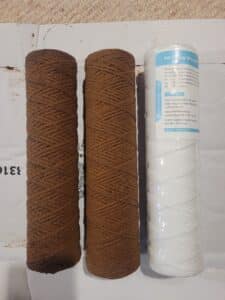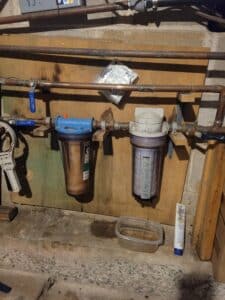At Chester County Home Inspections, one of our core services is Well Certification. This essential service certifies whether your well and its equipment are in good working condition and capable of supplying the water needed to sustain your household. We evaluate critical factors such as water yield, flow rate, pressure, and the overall condition of related water delivery components to give homeowners peace of mind.
Understanding Common Contaminants
In addition to inspecting and testing the well water delivery system, we assess the status of installed water treatment systems to determine their effectiveness in addressing potential water contaminants. Here are the most common contaminants found in well water:
- Sediment: Soil particles carried by groundwater into the well. The amount depends on the soil type in the area.
- Microorganisms: Bacteria, such as coliform and E. coli, can render water unsafe to drink.
- Iron: Present in two forms – Ferric (solid) and Ferrous (dissolved). Iron is a nuisance and may cause health issues in high concentrations.
- Nitrate: Often from agricultural runoff, it poses health risks at elevated levels.
- Heavy Metals: Metals like copper, lead, arsenic, and chromium can be hazardous in excess.
- Sulfur: Causes a distinct “rotten egg” odor when present in high amounts.
- Fluoride: Beneficial in small amounts but a health concern in excess.
- Organic Chemicals: Byproducts from pesticides or pharmaceuticals that can leach into groundwater.
The Role of Sediment Filters
Of all these contaminants, sediment is the easiest to address with a disposable filter. Sediment naturally occurs in all wells and tends to increase during periods of high water usage when the water table drops. Removing sediment is a crucial first step in ensuring clean water.
However, it’s important to monitor the condition of sediment filters regularly. A clogged filter reduces water pressure and flow.
Types of Disposable Sediment Filters
There are three common types of disposable sediment filters, each suited for different needs:
- Polypropylene Filters: Ideal for fine particles in low-sediment wells but clog quickly in high-sediment conditions.
- Polyester Filters: Similar to polypropylene, these are effective for fine particulate removal.
- Cotton String-Wound Filters: Best for high-sediment wells due to their depth, which traps particles more effectively.
For wells with significant sediment, string-wound filters arranged in stages (e.g., 50-micron primary filter followed by a 20-micron secondary filter) offer efficient filtration. The accompanying photo illustrates clogged sediment filters arranged in series, demonstrating how staged filtration helps remove both coarse and fine particles.


Do You Need Additional Water Treatment?
Homebuyers often ask us which water treatment systems they should install. In most cases, a sediment filter is sufficient, as the majority of well water requires no further treatment.
Be cautious, though – water treatment companies may recommend systems that are not truly necessary. Their analysis might be biased or incomplete because they profit from selling equipment. To make informed decisions and with no conflict of interest, have your water tested independently by a laboratory licensed by the Pennsylvania Department of Environmental Protection.
Water Quality Services: Independent Testing You Can Trust
If you’re unsure about the quality of your water, we offer a Water Quality Service. This affordable service involves collecting water samples in approved containers, submitting them to a certified laboratory, and providing you with detailed results.
With this information, you can decide whether additional treatment systems are needed based on facts – not sales pitches.
